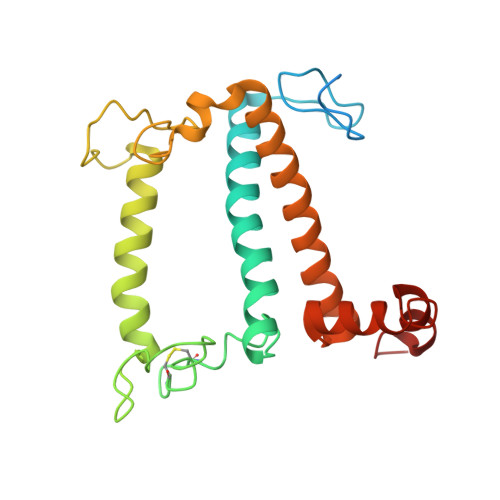The photosystem I supercomplex from a primordial green alga Ostreococcus tauri harbors three light-harvesting complex trimers.
Ishii, A., Shan, J., Sheng, X., Kim, E., Watanabe, A., Yokono, M., Noda, C., Song, C., Murata, K., Liu, Z., Minagawa, J.(2023) Elife 12
- PubMed: 36951548
- DOI: https://doi.org/10.7554/eLife.84488
- Primary Citation of Related Structures:
7YCA, 8HG3, 8HG5, 8HG6 - PubMed Abstract:
As a ubiquitous picophytoplankton in the ocean and an early-branching green alga, Ostreococcus tauri is a model prasinophyte species for studying the functional evolution of the light-harvesting systems in photosynthesis. Here, we report the structure and function of the O. tauri photosystem I (PSI) supercomplex in low light conditions, where it expands its photon-absorbing capacity by assembling with the light-harvesting complexes I (LHCI) and a prasinophyte-specific light-harvesting complex (Lhcp). The architecture of the supercomplex exhibits hybrid features of the plant-type and the green algal-type PSI supercomplexes, consisting of a PSI core, an Lhca1-Lhca4-Lhca2-Lhca3 belt attached on one side and an Lhca5-Lhca6 heterodimer associated on the other side between PsaG and PsaH. Interestingly, nine Lhcp subunits, including one Lhcp1 monomer with a phosphorylated amino-terminal threonine and eight Lhcp2 monomers, oligomerize into three trimers and associate with PSI on the third side between Lhca6 and PsaK. The Lhcp1 phosphorylation and the light-harvesting capacity of PSI were subjected to reversible photoacclimation, suggesting that the formation of Ot PSI-LHCI-Lhcp supercomplex is likely due to a phosphorylation-dependent mechanism induced by changes in light intensity. Notably, this supercomplex did not exhibit far-red peaks in the 77 K fluorescence spectra, which is possibly due to the weak coupling of the chlorophyll a 603- a 609 pair in Ot Lhca1-4.
- Division of Environmental Photobiology, National Institute for Basic Biology, Okazaki, Japan.
Organizational Affiliation:






















